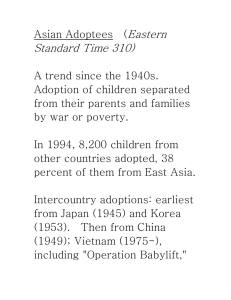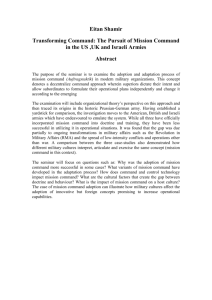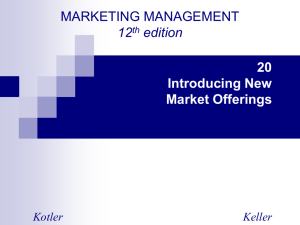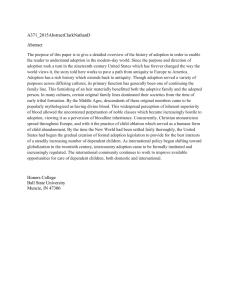BOSTON COLLEGE ADOPTION BENEFITS Introduction
advertisement
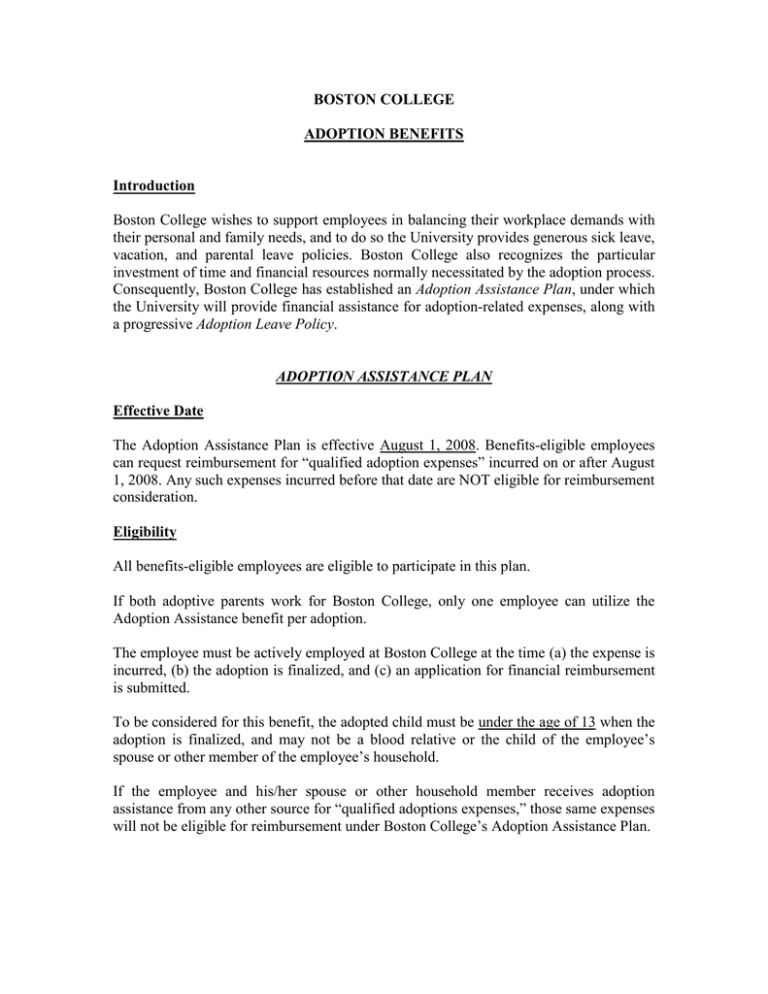
BOSTON COLLEGE ADOPTION BENEFITS Introduction Boston College wishes to support employees in balancing their workplace demands with their personal and family needs, and to do so the University provides generous sick leave, vacation, and parental leave policies. Boston College also recognizes the particular investment of time and financial resources normally necessitated by the adoption process. Consequently, Boston College has established an Adoption Assistance Plan, under which the University will provide financial assistance for adoption-related expenses, along with a progressive Adoption Leave Policy. ADOPTION ASSISTANCE PLAN Effective Date The Adoption Assistance Plan is effective August 1, 2008. Benefits-eligible employees can request reimbursement for “qualified adoption expenses” incurred on or after August 1, 2008. Any such expenses incurred before that date are NOT eligible for reimbursement consideration. Eligibility All benefits-eligible employees are eligible to participate in this plan. If both adoptive parents work for Boston College, only one employee can utilize the Adoption Assistance benefit per adoption. The employee must be actively employed at Boston College at the time (a) the expense is incurred, (b) the adoption is finalized, and (c) an application for financial reimbursement is submitted. To be considered for this benefit, the adopted child must be under the age of 13 when the adoption is finalized, and may not be a blood relative or the child of the employee’s spouse or other member of the employee’s household. If the employee and his/her spouse or other household member receives adoption assistance from any other source for “qualified adoptions expenses,” those same expenses will not be eligible for reimbursement under Boston College’s Adoption Assistance Plan. 2 Benefit Amount Adoption assistance is payable under the plan only after the adoption is finalized. Documented “qualified adoption expenses” for an eligible child will be reimbursed to a maximum of $5,000 per final adoption. Qualified Adoption Expenses “Qualified adoption expenses,” as defined by Internal Revenue Code Section 137, are reasonable and necessary adoption fees, court costs, attorneys’ fees, and other expenses directly related to, and whose principal purpose is for, the legal adoption of an eligible child. The expenses must have been incurred, and the adoption finalized, while the claimant was a Boston College employee and on or after the effective date of the plan. Eligible expenses include: Public and private adoption agency fees permitted or required under the law of the state having jurisdiction over the adoption Legal fees and court costs Costs for medical and hospital services provided to the child (not otherwise covered by insurance) Traveling expenses, while away from home, which are associated with the adoption, including transportation, meals, and lodging Immigration, child’s immunization, and translation fees Temporary foster care charges provided before placement of the eligible child in the employee’s home. Other expenses as determined by Boston College, in accordance with applicable federal tax law. Expenses Not Eligible Adoption expenses that are not eligible for reimbursement include: Expenses incurred before August 1, 2008, or incurred after a person ceases to be a benefits-eligible employee Expenses for the adoption of the child of an employee’s spouse or of another household member Expenses used as a credit or deduction under any other federal income tax rule Fees for services not yet performed Expenses covered under another adoption assistance or medical plan Expenses paid by voluntary donations or contributions Personal items for the child Expenses associated with a surrogate arrangement Living expenses of the biological parent(s) Costs to obtain guardianship or custody of a child which are not associated with the adoption of that child 3 Timing and Procedure for Reimbursement Eligible employees may apply for reimbursement of “qualified adoption expenses” after the adoption has been finalized. An application for reimbursement must be made within 90 days following the date the adoption is finalized. The employee must submit to the Benefits Office a completed “Adoption Assistance Claim Form,” an official copy of the record of placement or final court order, and itemized receipts for all relevant qualified expenses. [Note: All eligible expenses must be submitted for reimbursement at one time.] Upon approval, the reimbursement will be processed as soon as feasible through the employee’s regular paycheck. Tax Treatment of Reimbursement The information provided here is a summary of the current tax laws as they apply to the Boston College Adoption Assistance Plan. This is not intended as tax or legal advice, and individual employees should consult with their own tax and/or legal advisors prior to participation. For more information concerning tax implications, see IRS Publication 968 – Tax Benefits for Adoption, Form 8839 – Qualified Adoption Expenses, and Instructions for Form 8839, which are available on the IRS website at http://www.irs.gov/. Boston College will not withhold federal or state income taxes on reimbursements under the Adoption Assistance Plan, since the IRS provides that adoption expenses reimbursed under an employer’s adoption assistance program may be excluded from gross wages if certain criteria are met. There is also a federal adoption tax credit available, subject to income limitations, of up to $11,650 (in 2008) for qualified adoption expenses. Employees may use both the income exclusion for adoption assistance paid under this program and the federal tax credit for qualified adoption expenses, provided that the same expenses are not used for both purposes. Boston College will withhold FICA taxes on reimbursements under the plan to the extent the employee’s total FICA wages, including the adoption reimbursement, do not exceed the calendar year FICA maximum. Boston College will withhold FICA-HI (Medicare) taxes on all wages, including the reimbursement amount. IRS rules state that both the tax credit and the income tax exclusion for adoption expenses begin to phase out as the modified adjusted gross income (modified AGI) of the employee and the spouse exceeds $174,730 (in 2008). The income exclusion is completely eliminated once the modified AGI reaches $214,730 (in 2008). If an employee believes that the phase-out of the income exclusion for the plan benefit will apply, and thus the Adoption Assistance under the plan will ultimately be taxable, the employee may increase his/her tax withholding by completing a revised Form W-4 in the HR Service Center. 4 In all cases, the employee is responsible for the accurate reporting to the IRS and state taxing authorities of amounts reimbursed under the Boston College Adoption Assistance Plan. Such amounts are identified in Box 12, with code “T,” on the employee’s year-end W-2. In the event that the content of this summary, or any oral or written representations made by any person regarding the Adoption Assistance Plan, conflicts or is inconsistent with the provisions of the official Plan Document, the provisions of the Plan Document are controlling and will govern. Boston College reserves the right to amend, modify, or terminate the Plan, in whole or in part, at any time. 5 ADOPTION LEAVE POLICY Effective Date and Eligibility Effective August 1, 2008, all benefits-eligible employees who have completed at least one year of service are eligible for the following adoption leave-of-absence policies. Paid Adoption Leave Boston College will grant up to eight weeks of paid adoption leave to an eligible employee during the period immediately following placement of the adopted child in the employee’s home. To be eligible, the employee must certify on an Affidavit that he or she is the primary caregiver for the adoptive child, and the child must be under the age of 13. This leave will not be charged to the employee’s sick or vacation accruals. If both adoptive parents work for Boston College, only one may be designated as primary caregiver. (This Paid Leave policy does not apply to an employee adopting a blood relative or the child of the employee’s spouse or other member of the employee’s household.) [Note: A primary caregiver who has not completed a year of service will be entitled to one week of Paid Adoption Leave for each full calendar month of completed service, to a maximum of eight weeks.] The paid leave will not apply to periods when the employee would otherwise not be working - for example, in the case of an academic year position where the eight-week period extends into the summer. The paid period is not extended by the occurrence of any holidays or emergency closing days that fall within the first eight weeks. A benefits-eligible employee who is an adoptive parent, but not the primary caregiver, will be granted one week of Paid Adoption Leave, also not charged to sick or vacation accruals. The leave must be taken within 12 weeks of placement of the child in the employee’s home. Adoption leaves run concurrently with any entitlement under the federal Family and Medical Leave Act (FMLA). Unpaid Adoption Leave Under the Family and Medical Leave Act (FMLA), an employee who has completed a year of service is generally entitled to a maximum of 12 weeks of unpaid adoption leave. Any portion of an eligible FMLA leave not covered by the Paid Adoption Leave policy or by available vacation accruals will be unpaid. 6 Employees not eligible for Paid Adoption Leave or FMLA leave, or who are eligible but wish to request extended leave, may request an unpaid leave. The request will be subject to approval by their department and the Benefits Office. Procedure for Leave-of-Absence As early as they can, employees are requested to provide their supervisor/manager with preliminary information regarding their need for adoption leave, including any necessary pre-placement time off to be charged to vacation accruals. The formal request for leave should be submitted in writing to the employee’s department and the Benefits Office as soon as the dates are available. A completed “Primary Caregiver Affidavit”must be submitted with the application for Adoption Leave. [The Adoption Leave Policy is subject to ongoing review and may be amended at any time.] J:Adoption Assistance:AdoptionBenefitsJune2008
